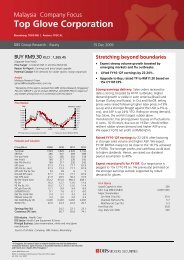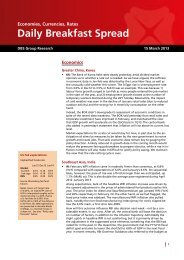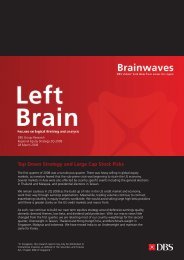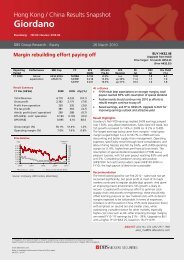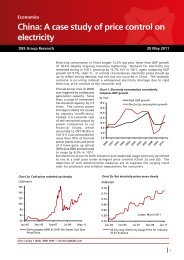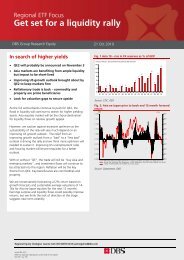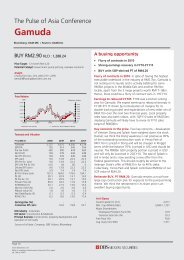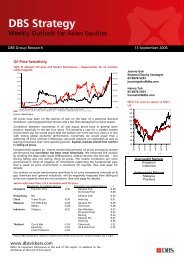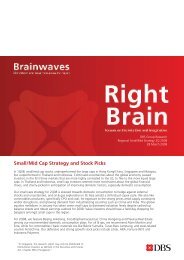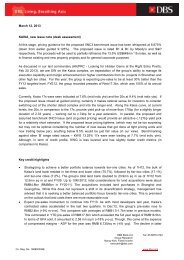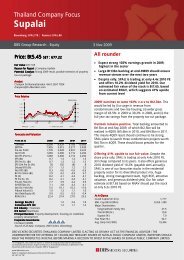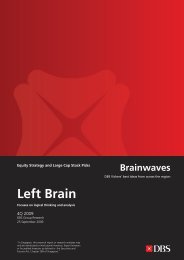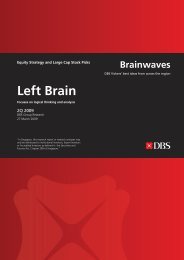Economics Markets Strategy - the DBS Vickers Securities Equities ...
Economics Markets Strategy - the DBS Vickers Securities Equities ...
Economics Markets Strategy - the DBS Vickers Securities Equities ...
Create successful ePaper yourself
Turn your PDF publications into a flip-book with our unique Google optimized e-Paper software.
<strong>Economics</strong> – <strong>Markets</strong> – <strong>Strategy</strong><br />
Currencies<br />
The Good ...<br />
The three Asian currencies that have consistently held up so far this year were<br />
<strong>the</strong> Chinese yuan (CNY), <strong>the</strong> Singapore dollar (SGD) and <strong>the</strong> Taiwan dollar (TWD).<br />
These three currencies share one common feature. All three favour stronger<br />
exchange rates to fight inflation.<br />
Of <strong>the</strong> three currencies, we like <strong>the</strong> TWD most on a relative basis. As at Jun 9,<br />
<strong>the</strong> TWD is still <strong>the</strong> Asia’s best performing currency this year. Our optimism is<br />
based on <strong>the</strong> return of <strong>the</strong> Kuomintang government. Since <strong>the</strong> presidential<br />
elections in March, Cross-Straits relations have improved with policymaking<br />
returning focus towards boosting <strong>the</strong> Taiwan economy.<br />
On <strong>the</strong> o<strong>the</strong>r hand, we are wary of <strong>the</strong> SGD’s strong correlation with major<br />
currencies, which we expect will bow to <strong>the</strong> USD’s recovery especially when <strong>the</strong><br />
US start hiking rates again. At witnessed in 2005, a higher USD/SGD is also not<br />
inconsistent with an appreciating SGD NEER policy, which started in Apr 2004.<br />
... <strong>the</strong> Bad ...<br />
The three Asian currencies that have consistently underperformed this year were<br />
<strong>the</strong> high yielders - Indian rupee (INR), Korean won (KRW) and <strong>the</strong> Philippine<br />
peso (PHP). Last year’s winners - INR and PHP - turned out to be this year’s losers.<br />
The KRW’s depreciation, which started in 2007, turned from bad to worse.<br />
Due to increased external borrowings over <strong>the</strong> past few years, KRW and INR are<br />
vulnerable any unwinding of JPY carry trades and shortages of USD liquidity. In<br />
terms of international liquidity position, <strong>the</strong> KRW is considered to be more<br />
vulnerable because external debt overtook foreign reserves in Korea, while India’s<br />
foreign reserves continued to outpace external borrowings. Both INR and PHP<br />
are more sensitive to downsides in <strong>the</strong>ir stock markets compared to <strong>the</strong> KRW.<br />
Since <strong>the</strong>y were <strong>the</strong> first to start, <strong>the</strong>se three currencies are also likely to be <strong>the</strong><br />
first to finish returning some of <strong>the</strong> past years’ gains to <strong>the</strong> USD. Once <strong>the</strong><br />
correction is completed, <strong>the</strong>se currencies have a track record of consolidating in<br />
a wide range, as <strong>the</strong>y await <strong>the</strong>ir peers in <strong>the</strong> region to do likewise.<br />
... and <strong>the</strong> Ugly<br />
The market is looking for <strong>the</strong> Vietnamese dong to suffer a devaluation of 20%<br />
to 40% over <strong>the</strong> coming year. For now, we do not consider this to be an imminent<br />
risks and sees a full-year devaluation of 5% instead in 2008. Although Vietnam<br />
has <strong>the</strong> worst inflation and trade deficit in Asia, FDI inflows still appear to be<br />
covering <strong>the</strong> latter.<br />
Political risks to watch<br />
There are three currencies with political risks that we are paying close attention<br />
to. (1) Post-election Thai baht (THB) is persistently troubled by rumours of ano<strong>the</strong>r<br />
military coup, which have <strong>the</strong> potential to distract <strong>the</strong> government from <strong>the</strong><br />
economy. (2) Post-election Malaysian ringgit (MYR) is worried about leadership<br />
challenges confronting its weakened prime minister. Barring political uncertainties,<br />
<strong>the</strong> MYR is actually a fundamentally sound currency that <strong>the</strong> US Treasury considers<br />
as undervalued. (3) The INR will be vulnerable if <strong>the</strong> protests to inflation and<br />
higher fuel prices become loud enough for <strong>the</strong> communist allies to pull its<br />
support from <strong>the</strong> government ahead of next year’s elections.<br />
27



